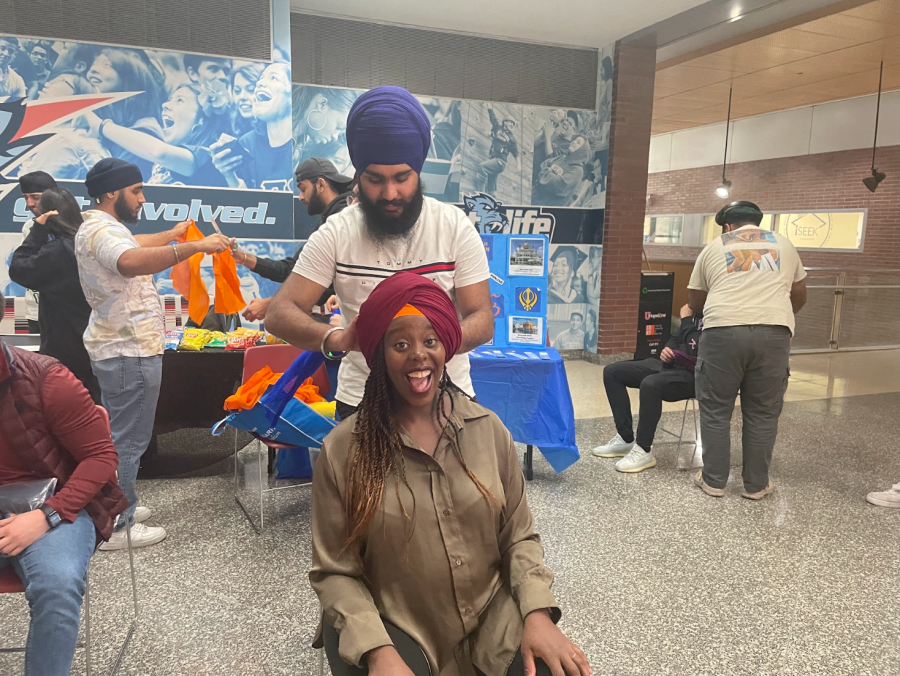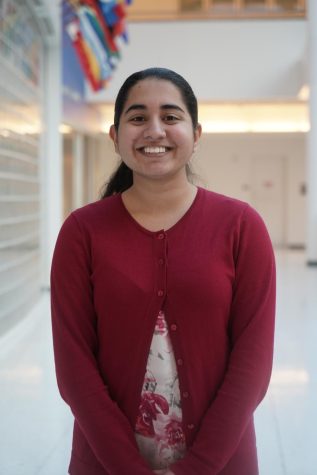Baruch United Sikh Association hosts Turban Day for all students
May 1, 2023
The Baruch United Sikh Association invited students to learn about the significance of turbans in the Sikh tradition during “Turban Day” on April 20. While playing Punjabi songs like “SYL” by Sidhu Moose Wala and “My Pride” by Tarseem Jassar, they offered snacks and a turban-tying experience on the second floor of the William Newman Vertical Campus.
Vice President Dashmesh Singh spoke about how the event strived to spread awareness about Sikhi, which was founded in 1469 in Punjab, North India. It is one of the youngest religions in the world.
“A lot of times we’re covered in the media, but we are misrepresented,” Dashmesh said. “A lot of times people will see the term and they’ll think Muslim, they’ll think Hindu. They’ll think terrorist even at times, but it’s something that is totally contrary to what is typically thought about a turban.”
Dashmesh said that the “turban is a crown given by the Sikh gurus,” and club members explained this significance as they wrapped each attendee’s head with a turban.
The term “guru” means teacher and refers to any of the original 10 spiritual leaders who helped establish Sikhi.
“Back in ancient India, the turbans were worn by people of higher caste,” Paramvir Singh, one of the club’s two treasurers, said. “It was used to identify like, these are the rich and these are the poorest,”
He said equality is present, even in the tradition of the turban.
“Our gurus, they taught us that everyone’s equal,” Paramvir said. “There’s no difference, so we’ve adopted the turban and let anybody wear it, whether it’s a man, woman, rich, poor. Their background doesn’t come into it. It’s basically like our uniform.”
Margaret Van-Ess Holman, who works in the Office of Student Life, was among the first to sit down for a turban wrapping.
She said she wanted to learn more about the religion because of its “support and valuing of women.”
“I also grew up in Flatbush, so I grew up around a large, diverse group of people and I went to school with a lot of Sikhs, and to learn a little bit more about their religion was really helpful,” Holman said.
As they tied the turban, club members explained that in the Sikh faith, men and women do not cut their hair because God created them with it.
The 10th Sikh Guru, Gobind Singh; instructed all Sikhs of any background to wear a turban to protect their hair and to create quality among them.
Jason Galak, vice president of Academics Affairs for the Undergraduate Student Government, said he learned a lot about Sikhi from attending the event.
“Honestly, I have a lot of Sikh friends, and I’m always wondering how — like, there’s like an art to tying the turban — and I was always so curious how they make it,” Galak said. “So it was just cool to finally see it in action. It’s a great experience.”
While some students gravitated toward the table, others expressed discomfort of wearing a turban when they are not of a Punjabi background. Dashmesh, however, said he disagrees with this sentiment.
“Think about it like a bouquet of flowers, right?” he said. “You have a bouquet of flowers, and you want to tell people about your bouquet of flowers. Are you going to scream at them, ‘Hey, look at my look at my flowers. They’re so beautiful.’ Or are you going to talk to them, you know, express what they mean to you? What the flowers stand for, you know, express their beauty. I think it’s more of the latter. The second one, that’s kind of how Sikhi spread, especially in America, so you see a lot of non-Punjabi Sikhs.”
The Baruch United Sikh Association drew inspiration from the annual Turban Day held in Times Square, during which Sikh volunteers tie turbans on New Yorkers and teach them about Sikhi and the importance of the turban.
The organization Sikhs of NY set the Guiness World Record for most turbans tied in eight hours, totaling 3,010, in 2018.
While not at that scale, Baruch’s Turban Day also saw a large turnout, with at least 25 turbans being tied at one point.
Next year, they plan to have more available to meet students’ demands.
“A turban stands for justice, it stands for equality, it stands for respect, it stands for love,” Dashmesh said.








